It’s not about the gear. Learn from a 17-year-old.
As readers of my blog, most of you probably discovered this site because of all the gear reviews I have been doing so far, or some samples of the work I did (check the “My Work” section above). Many of you are first-time filmmakers looking for all kinds of valuable information with regards to DSLR filmmaking. It has been called a revolution by many, and I am one of them, because the “film look” is as easily accessible as it has never been before in filmmaking history. It has truly democratized the filmmaking process.
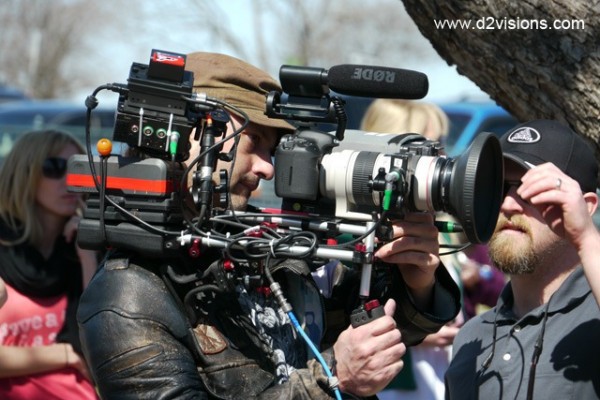
The pimped-out 7D Robert Rodriguez used for a music video shoot - maybe great for some of the big guys, but is it really necessary for the rest of us?
Expensive filmmaking gear used to differentiate some filmmakers from others. There were (and still are) many filmmakers who think that the very fact that they own a lot of expensive gear makes them great filmmakers. Somehow, I think this is some kind of genetic predisposition that especially men seem to share. I guess that’s the ‘pack rat’ instinct that we all share, who knows.
The satirical Facebook fan page “My Mom bought me a RED camera so now I’m a DP” helps to look at our very own urge to always own the latest and greatest gear in an ironic way.
In short, a lot of filmmakers hide behind their gear. It somehow relieves them from the thought that they need to make FILMS in order to become great filmmakers. Making films is A LOT of work. It’s too much work for many self-proclaimed ‘filmmakers’.
[If you think about it, it’s quite strange: We are all happy that we can shoot incredible-looking images with our very inexpensive DSLRs. On the other hand, we strive to spend more and more money on pimping out these cameras, which makes us lose many of the advantages we gained with their form factor in the first place.]
Anyway, every once in a while, it’s good to take a step back and look at what really matters. If you shoot a great film, it’s great because of its content. Nobody will ask you what it was shot on. That is, nobody beyond our tiny circle of filmmakers who want to learn from each other. But we are not the core audience in 99 out of 100 cases. Other people are – people who don’t know a thing about filmmaking. They just don’t care. (Compare this: I also don’t care where an apple grew as long as it tastes good – maybe I should care, but in fact I really don’t.)
Today I came across one example of a great little film that became quite a viral success only during the last few weeks. It’s called “To Claire; From Sonny” and was made by a 17-year-old filmmaker from Australia, some of his friends and with an inexpensive DSLR camera (7D, but it’s irrelevant). He has film as a course in high school.
The short film is about the protagonist Sonny, who reads out a letter to his lost love off-camera. He directed and wrote the film, and also composed the music.
Partly through the director Josh Beattie’s talent, partly through luck, the short film was somehow discovered a few days ago by the blogosphere and has since become a viral hit with more than 400,000 views.
I think it’s a very decent film for such an endeavor, albeit a bit “cheesy” at times with all the off-camera narration. But you know what: That doesn’t matter. People love it.
The really great thing about it is the fact that it gained him a €58,000 scholarship for a private film school in Queensland.
Some interesting (translated) quotes from Beattie’s interview with the German news magazine Der Spiegel:
Spiegel Online: Do your teachers know that your film is such a success online?
Beattie: Yes. They wanted me to take it offline at all costs. Simply because when it’s on YouTube, the film cannot be entered into several film festivals. But I think it’s more important that many people on the internet discover it. If they like the short film, this is worth much more than when it rods in a drawer and possibly wins a shiny price.
I couldn’t agree more with him. I know of many people who have done absolutely terrific work with short films and really everybody should see them – but they decided to keep them offline, because they don’t want to see their possibilities of entering it into film festivals jeopardized.
Let me say one thing about film festivals: They are great for exposure and publicity, but only a tiny amount of festivals really deliver on their promises of getting you that kind of exposure you’re hoping for. There are far too many out there, but that’s only one reason why their importance is dwindling. While personal contact with audiences can’t be replaced by anything, especially for short films the Internet has become a great haven for fresh talent and innovative ideas that are easily overlooked by juries that think in “old industry” or “old content” terms.
I know what I’m talking about as I have had several of my productions in festivals around the world. With my 2007 documentary “Every Step You Take“, I managed to get into 14 film festivals from Brazil to Europe and California … it was a great time and made the film relatively known in certain filmmaking circles, but in the end didn’t really do much for its overall “fame” with the “masses”. I haven’t been able to put it online yet because it’s out for TV distribution, but that is something that short films can hardly achieve. Do you know many TV channels that screen unformatted short films? Exactly – that’s why I think Josh Beattie made the right choice here by putting it on the Internet. Film festivals could have only done so much for him, short films are often only screened in a row with several others, while the audience already forgets the one they have just seen when a new short film is starting.
Let me close this blog post with another quote from the interview:
Spiegel Online: So you don’t really need expensive equipment to produce a successful short film?
Beattie: No. When somebody wants to become an artist and fears the big, wide world, then he should know that nothing can stop him. We believe far too often that we are dependent on the rich guy in a suit who discovers our talent. That’s simply not true. In case I ever make a career in filmmaking, I can look back at how it all began: with a simple camera, a laptop, my friends and a lot of enthusiasm.
I have nothing to add to that.
[To my American friends: I think that was my belated Thanksgiving post :-)]
-
Anyone know where to get that lens hood Robert is using?
-
I guess that would;d be a…NO
-
-
Belated happy thanksgiving Nino! That kid has the right approach and gear is definitely not everything. Story is. This post was a nice story!
-
Great post Nino!
It’s not always about the tools we have, but more about the creativity we make.
-
Well said, Nino (and Josh)
It’s very refreshing to see impressive things made on very little…much more so than seeing how much crap is made with multi-million dollar budgets and hundreds of people working on features with not even half as much soul as this little short.
Internet success is scalable and thanks to sites like YouTube and vimeo can take you far. If you have a story to tell, people will listen (if you tell it well and make it pretty 😉
-
Great post! And I still have no expensive rig, mattebox and all that fancy stuff 🙂
-
You say that the 7D is cheap, it depends for whom? There are some who can not afford it, my mom is not Rothschild! (Injury)
The short film, the screenplay is not original, but the pictures are beautiful, the editing is good.
However, it is true what you say about the equipment, there are those who make too! I try to put money aside to 550D, are more affordable price for me, but times are hard, and must be lucky.
+.
Sorry, but I translated the French with Google! -
This may be your most important blog post so far, Nino. I absolutely agree, this guy is someone everyone of us can learn a lot from. And I’m not talking about filmmaking per se, but about believing in oneself and especially about that last quote.
Thank you for posting this.
-
Actually, a good point about film festivals is that if your video is successful enough on YouTube or Vimeo, they’ll invite you to screen. Your films internet fame will be used as a drawing point for them to their prospective audience.
Great video, especially considering his age. Looks beautiful, nice score, and well told.
Take Care,
Chris -
Hmm. If the movie would not have this DSLR niceness, it would be quite terrible. It is the proper use of specific 7D qualities that make the difference. And with some extra gear (shouldermount, cameralight) he would even have made a better film.
Talent and creativity are so much overrated.
-
Hey, very nice post Nino! It fits very well with my philosophy. Filming is not about gear, it is about going out and making a film! I guess when bigger companies start to acknowledge the value of internet exposure, they will look at Youtube and Vimeo and pick the filmmakers they like directly and omit the production companies more and more. Hence, internet exposure is what counts.
-
My dad always tell me, make the best with what you have now and this is the case of this blog post. Don’t wait till you have a monster rig and a 5D mk2 or a Red to start telling your stories in film.
Thanx for the post Nino, hope more people see that it’s not neccesarily about the gear but what comes of it in the end (the product). So everyone, go out there and tell your story with what ever tools are at your disposal, i am doing so with my T2i and my dads 29year old tripod. Short coming in january 2011 from my corner of AFRICA. -
Great point and often taken out of perspective.
Its the same with music. If you don’t have a well arranged/written song, it doesn’t matter if you polish it up with the bests mixing gear, pre-amps, mics, etc….its not going to work. Song first. Gear second.For filmaking: composition, lighting, audio, story telling….IF you have prioritized that…then you say GEAR. Let’s be honest, we want the best gear we can afford but if the above isn’t there, then its useless but if you do have it….then gear next. And we’re fortunate now (2010) that a $1K camera can yield pro quality results.
-
How much hypocrisy and irony in this blog. It’s possibly too little too late for someone that has spent a huge amount of time advocating Zacuto pimp Philip Bloom who along with Shane Hurlbut has done a lot to damage and un-democratise DSLR film making by shilling largely unnecessary products for big accessory companies.
That said, as a result of you blog I did find out about the ultra cheap battery grip for my 550D and the wonderful Canon 50mm f1.8.
I’m a little confused, on one hand your backing the big boys and now your speaking up for creativity over expensive gear. Consequently it just leaves me with the impression you’re jumping on a new (for you) bandwagon.
-
Hey Roger,
You are so ill informed it’s almost laughable. I am the biggest advocate of as little gear as possible if you bothered to ever read anything I write. Get your facts right please before being insulating people.
Thanks
Philip
-
Hear, hear! As a cinematographer I’m always trying to get the best image I can get. And sometimes that means getting the expensive gear. You are much better off getting it from a trusted brand (like Zacuto) than some hodey chinese cheep shit that wont last a job. The expensive gear = usually the best longest lasting quality gear. And when you already have a package worth thousands of dollars do you really want to trust some unknown brand to make things work? Hence why I’m sure Nino and Philip advocate the expensive (quality) stuff.
-
Hey Phil
It wasn’t an insult it was an opinion (on re-reading a heavy handed one, so apologies) to which I’m entitled, if you have a problem with that keep it in the thread because I don’t appreciate being emailed with veiled threats.
Nino I’m shocked you passed my email address on to Mr Bloom.
It’s now fairly obvious to me if your opinion differs or challenges ‘the establishment’ ranks are closed and threats are made about your future in the industry.
So guys show me some respect and keep it in the thread.
-
“So guys show me some respect ”
It goes both way, not just one.
-
-
Roger are you serious? Philip Bloom and Shane Hurlbut damaged DSLR filmmaking? How?
Creativity does make up for gear but gear can unleash creativity and create something that you couldn’t make with out it.
Nino- good post. I agree with all you said but I think in some cases you need gear to get the job done. Especially for paid jobs. I wrote an article on it here http://robertruscher.com/?p=395 .
-
Oh Roger, you drama queen you!
There were no threats. I simply said being rude about people publicly in such a small industry is just daft. Want to slag off myself and Shane Hurlbut then go for it but it’s you who comes off badly not us.
Oh, and as for Nino “giving” me your email address? Mate, just click your name on this blog and it goes to your website. You have a contact me section…not exactly Sherlock Holmes. I wanted to simply take this off the public forum so this thread could be about the topic at hand but you clearly have no desire for that to be the case. So go ahead mate. I honestly don’t care. I was simply trying to give you some advice that you clearly don’t want. So go ahead and rant away!
-
Personal insults Roger DO NOT BELONG IN ANY THREAD, that is why I took it out of this thread.
Did you just call me part of the “establishment”? That’s hilarious! I am about as far away being part of the establishment as possible!
-
Now this is content!!!
-
Apologies to Nino it did occur to me after I’d posted that Philip probably used the contact form it’s just that the mail I received didn’t look like the ones that normally come via my website.
Phil, It’s easy to misinterpret stuff in writing from a person you don’t know hence my taking your email as a veiled threat and you taken my choice of language as an insult. Whilst I have a tendency to be aggressive in posting it’s not a purely online persona it is who I am and it stems from being passionate and usually gets results. If I ruffle a few feathers trying to start a real discussion so be it.
All I wanted was to make people aware that expensive gear is not the only option, but it is the one that is most prevalent due to the marketing by companies like Zacuto & Red Rock Micro and affiliate marketing and the bias that may introduce It is something I disagree with on a personal level, my concern being that people will blindly go out and spend hundreds of pounds on stuff they don’t need it because you guys promote it. It’s a subject I feel deeply passionate about and it’s something that is prevalent and something I think is fundamentally wrong with our society and typified by the obvious profiteering as a result of the DSLR video boom.
Ultimately and ironically I’m actually agreeing with the blog post.
Roger Armstrong
-
-
-
Hey i believe gear in the end, is not what counts…theres a lot of movie made with the best gear in the market and yet sucks a lot in the content.
youtube show this a lot. the most watched movies are made with simple a cheap gear. -
Dear Nino,
What you have said is completely true. I believe that Creativity certainly tops Technique.For people who have the “not-having-the-right-gear” problem, I recommend the heavily inspiring Robert Rodriguez’s book ‘Rebel without a Crew’.
-
I actually think gear and content are rather far away from one another. I mean, gear can be purchased but content has to be conceived and created.
-
Here is my 5 cents, I did not like the film (“To Claire; From Sonny”) at all. If it was shot in IMAX it would have made little impact on the craft of telling a story.
Good for a 17 year, but I did not get past halfway and I was bored.
As for the debate in general…. hmmm… I do not specifically care what gear was used to create the content but I care more for the overall quality. If it looks and feels expensive I am generally happy. I HATE a “student amateur” feel to anything and the moment I sense that no effort was made I switch off. Yes I will agree that even if the story is compelling I may be so put off the fact that technically it is bad. There is a line however that one should be careful not to cross.
People must stop confusing technology with talent.
-
I have been thinking about this subject matter a lot. I started out being a gear fanatic. I was simply fascinated by the possibilities of what you can do with gear.
Then, at one point I was feeling highly dissatisfied with the short movies that I made. They looked pretty good. I was really getting a sense of how to make the most out of the gear available, but it always felt shallow and empty.
No one really laughed, no one really cried. No one gave a tiny rats ass emotionally about the short. People watched it, liked the images but forgot about it right afterwards. I was highly discouraged but started to change my perspective. I stopped attending IBC or Cinec in Munich. I stopped following all the latest news about the latest whatever. My new goal was to understand what “art” (I define as art that has an emotional impact on me) is … and that is the point.
I realized that art is “the expression of experience”. So, if I don’t have anything to express then it really doesn’t matter. It’s like having the alphabet and putting randomly words one after the other – it doesn’t convey anything. It doesn’t move or upset anybody. And that’s the worst that can happen. Whether people love or hate it – that’s okay – but if people don’t give a shit – that’s the worst sign.
I still love gear but it really has one purpose – it’s the tool that I use to express something. Mastering the art of using that gear – and the very personal way of doing that – can become an art itself though. It’s like learning to move a brush and develop your own style – the style of the brush stroke but without a motif that expresses something about life eve Picasso’s brush stroke would be quite a bore.
What I learned is that I got it wrong at the beginning. I had access to gear and thought what I could do with it. I wanted to shoot something for the sake of shooting. But now, I know that the only purpose of shooting something is not to make pretty pictures (analogues to decorative art) or worse just use the gear available but to express something using the tools in the best possible way that serves the greater purpose.
Just some thoughts. 🙂
-
Hi, if I may speak my mind I think the right equipment can sometimes be a creative force. The DSRLs have been for me an expansion of my visual thinking. They gave me a feeling sensitive, very strong. But then, afterwards there was already a slave. Me. Now I have a Slider, a multi-rig, 35 lenses and so on. But I’m so happy like this…
P.S. I think Roger is under the influence of drugs, do not give him importance 🙂
-
Thanks, Nino. The problem with a lot of films these daze is that it is all about geewiz and not story. (particularly Hollywood – look at anything Micheal Bay does) This best films are the small independent film because they have to focus on story. That is what filmmaking is all about – telling a story. But this is not new. I remember working at a theatre in the early ’80’s and the owner and I were complaining back them about the lack of story in Hollywood films. Why is Pixar so successful? Story!
Gear is the ends to a mean. It helps you tell the story. The better you know your gear, the better you can craft your story. This is why it is very important to have the right gear for your abilities. Some require less and others more. I am of the less. I grew up with SLR’s and 16mm cameras, so I know them well. Some grew up with video cameras so they know them well and want their camera to be like that. I do not recommend everybody use a HDSLR. It is more like a film motion picture camera than a video camera. It requires the patience and practice the a film camera requires. Some just do better with a video camera. The manufacture’s are responding to that need of a large sensor video camera the does not rob the bank. But, it will still require good focus techniques because of the shallow depth of field.
Learn your craft so you can tell a great story.
-
It’s funny i was just thinking along these exact same lines the other day when i saw the reviews of the GH2. infact i wrote a short post on my blog about it. We can get too caught up in trying to keep up with the latest gear and lose sight of what it is we are trying to achieve. good post Nino.
-
Of course the story/directing is the most important. Charlie Chaplin’s movies still make money after 70 years. No color, hardly any sound.
I do feel gear is important. That is to say, knowing the possibilities and limitations of the gear. Without a fast lens, no shallow depth. No walking around without stabilizing gear. Sound is important, so some gear is needed there as well. For an amateur like me it is interesting to read what will give me the most ‘bang for the buck’.
Anyway, I do have a challenge for Nino, and all other DSLR blog writers. Instead of writing about gear and telling it is not that important, write a tutorial about story telling/cinematic techniques/editting, anything that helps create a ‘great movie’ what is not about gear.
-
If you are interested in what you just suggested to Nino I would like to invite you to my blog where I am writing about screenwriting, directing and art in general. 🙂
Trying to explain, provide insight and philosophize about it on a concrete project that I am about to start. 😉
-
-
it is important not to get caught up in gear. Get what you can to make things work for you. I stress in my workshops about a tripod being your best friend with these cameras and the joy of shooting with one single prime lens. The only two bits of gear I bang on about as essential are a vari nd and a viewfinder, like the Zacuto one or any of the others to give you a chance to get focus!
-
The Bloom Master is absolutely right, there’s something hugely appealling about travelling light and keeping the kit small.
I barely write about gear anymore unless it’s directly related to work I’m doing and it’s helping me solve problems. I much prefer talking about creative choices.
Having said that, as a director, being well on top of gear, being aware of the limits and possibilities of your equipment makes you much more effective.
Just a question of finding the right balance and being circumspect enough to realise that every piece of work you make will not be brilliant, that it takes balls to stand up and present your vision to the world and not everyone will like it. It’s also a craft which takes years to learn and even longer to master.
More filmcraft stuff coming on the blogette soon enough. That’s my whole thing anyway
-
-
Gear has it’s place, but I’ve seen some amazing stuff done with the camera, kit lens and a tripod. In the end, most people are not going to care if you had the best follow focus device, or the best LCD monitor with which to pull focus.
And Philip Bloom is a pimp… One of THE Pimp Daddy’s! 🙂
-
I don’t want to detract from how good of a storyteller Josh Beattie, at 17yrs old is, but just a quick look at the equipment used on the YouTube description shows over $4000 in software alone. Never mind another $2000 for the camera and microphone, and that’s not even considering the cost of the computer capable of running all of those programs. This kid has shifted his gear budget from production to Post-production.
I understand that not focusing on the gear is the point of your post, but considering the amount of gear used I think it’s unwise to ignore that it still plays a factor. As with any art you need substance and focus to go behind your good looking images, and this short has that in spades. But I highly doubt people would like this just as much if it were shot on a shitty cellphone with the internal audio and cut in iMovie.
Being a good storyteller is of course the backbone of all western media. But understanding what gear it is you need to accomplish the right things to tell your story properly is still important technique and requires a lot of experience and talent. Telling a compelling story using only the gear at hand is creativity and luck, and it only requires enthusiasm and courage. There really isn’t any demographic that has more enthusiasm and courage than 17 yr old boys. -
Hi, first can I say that I know nothing about cameras and filmmaking. I came to this site because I know Joshua Beattie and like the film he made. My humble opinion is this. The average Joe, doesn’t know about lenses and stuff like that. He just looks, listens and feels. So you guys look at things through different eyes – which is right because you are pros. I honestly think that To Claire;from Sonny would have worked even on a cheap camera and a sure mic. Why? Because it’s the story, the lines, the love, the death, and the music. Remember that the first song was sung with a piano and an elementary school choir in an hour. Pro musicians would hate it. But….remember the audience. Mostly women (and then a lot of teenage girls), love the words and have gone so far as to have written them out. What gives? I think Josh Beattie could have made a different story with the same gear, and had no effect – the difference is that women love a love story. I’ve read lots of the comments. Women love it. The few critics are men, who complain about the speed of the car and the improbability of it all – why was she in the middle of the road, wearing headphones etc. Get it? People look at different things.
In other words, you could have all the movie and sound gear in the world but a 30 min film about the budget session in parliament isn’t going to light up youtube. Another thing is the youtube dynamic. Seems to be young people who see things differently.For me there is a lesson in this for most professionals. My job is the same. As you said, you might like an apple. But you don’t know where it’s from. Maybe an apple industry expert would look at the apple totally differently and not even eat it? So, I think it comes down to the difference between peer review and the consumer. Sometimes you can get so caught up in your own profession that you lose sight of the simple.
Josh will be using a lot of gear at his film school. I hope he learns from what people liked about his first film. In fact, that’s a cool thing about youtube. You can see the comments from people who know nothing about the industry, but see why they liked the film.
Feel free to delete this post, as I’m not a film guy. But I liked your post, and it’s made me reassess my own job, and what works.
P.S I think Josh Beattie would welcome any suggestions. His real passion is making music though – which comes across in the film.
-
I think gear is about what you are trying to do and who you are doing it for, how fast etc
Sure you can make a wonderful film with a stills tripod, a nifty 50 and a 60d
However I was B cam on something recently , the A cam op was not tooled up for a pressured shoot with a deadline and a shot list
by 1400 hours he was using my spare batteries, he had no decent monitor so lots of misfocus shots etc etc etc
I reckon we only did 80% of the days shot list which was an embarrasment IMO – lucky it was his client not mine
You dont need gear but it helps working under commercial pressures
-
Also, what I wanted to add in my last comment. I don’t think that it’s hypocritical of Nino to write a post like this on a gear heavy blog. Quite the contrary is true. I think it adds credibility and depth by providing multiple perspectives and questioning the status q. It counter weights the blog which is always a good thing. And there is really nothing wrong with being a gear fanatic. I think it’s great to have a passion for something whatever it might be – but make sure that you are still aware of the wood by focusing on all the trees. 🙂
-
It hardly ever occurs to European filmmakers that the most important technical gear is the filmmakers brains. Get to know your film grammar first, folks!
-
On my collaborative blog at NeedCreative.net we try to focus on storytelling, techniques, project stories, short film showcases, etc. But we do gear stories too (ironically they are the most popular). If the craft is so key why focus on gear at all?
It’s really simple. If you want to build a house you need a good architect with an artistic vision. Then you need goos builders with the right tools. There’s an interplay of art and gear there. Now in our little admittedly indie film world, many of us do both jobs. We create the artistic vision and then we build it using tools available. It just so happens that recently the tools have vastly improved as well as come way down in price. This is exciting because it allows those who previously could imagine the house but not build it.
Wanting to create something, anything including art, requires resources and tools as well as vision. What seems to being lost in many blogs and conversations is half the story. Many concentrate on this new breed of inexpensive but professsional-result-producing gear. Is this is problem? No, because sites that focus on the craft part are plenty.
What I see lacking a bit are sites blogs workshops and conversations that integrate the concepts of story art.. The craft basically with tips on how to use the new breed of digital tools to enhance that craft. Lots of people are working this angle and that’s a good thing. Conversations about one side or the other alone aren’t trash though.
I think the frustration I see in many people is they think the gear discussions are nothing but a money grab. I doubt this is the case. Some people are interested in architecture and some in building. Thats not an issue. I just think that the more architects learn how to use a hammer, the better their buildings may become because they have a better understanding of the practical applications of their visions.
So all the fighting is silly. No one point is correct. I think it’s prudent for people to try to learn everything they can. I think the focus on the craft can’t be lost, but if you have a wonderul story but dont know how to show your visions then the result may be the same as someone who knows gear only but has no talent: nothing worth watching.
-
For me, content is king, for all the reasons stated, but as someone who wants to capture images and make films, the gear does matter, but not for gears sake. I think for me, the important part of having the right gear is to help keep the creative process going and to some degree, encourage it. I don’t have a big crew or years of experience and technique under my belt, so when I experiment, anything that’s helps inspire me, helps me realise my vision, or gives me hope that it will all be worthwhile, is a bonus. When I tinker on a piano, if that happens to be a grand piano with an awesome sound, that will get me in the zone and make me more creative than say an old out of tune upright. A truly professional musician would make both sound amazing, but that doesn’t mean that I won’t stumble across something good when experimenting. In the same way with filmmaking, knowing that if I am using kit that will capture images and sound beautifully, I am more free to try, and will more likely be proud with what is produced, and so therefore can focus on getting everything else right and that helps encourage me to keep going.
Even with the gear, the craft of filmmaking still needs to be learned, but I am happier being in that position knowing that when I get it right, the images & sound will be the best I can achieve for the money I can afford. If you know up front that the quality of your gear is substandard, then it’s much harder to make something you believe in, knowing that part of the result will be crap before you start. So gear does matter, up to a point, as a filmmaker, and so does (or should) everything else, actors, sets, script etc, but as a viewer, I think it matters much less in the conciousness, as long the overall experience was good. I for one have never stopped watching a film because it was made on the wrong camera or beacuse it was grainy, but I have stopped watching many that had poor scripts or actors! -
As long as people like the work, who cares what it was shot with? Only the filmmakers should really care because, if people like it, the filmmaker will continue making films and if they get access to better equipment they can use it to make more films. If people don’t like their work, the filmmakers will either try harder with content and/or get better tools to do so.
-
Thank you so much for posting this article. Working as a professional script consultant I could add many things to this really interesting topic. I wrote a longer article on my weblog (in German, just click on my name), but maybe one particular story might be of interest here as well:
I was member of the jury at the Alpinale short film festival this summer. There were all kind of short movies in the competition, from Dogme95-style to very expensive looks. But not a single film was dismissed by us because of its “bad” look. On the contrary – many of the movies where you could see that most of the money went into gear, set design and post production had very weak stories, dull dialog and/or uninteresting characters. The jury consisted of actors, producers, film critics, directors and me, a script consultant – and none of us was impressed by a weak story.That said, I am begging all the gear-oriented filmmakers out there to skip the next workshop on the latest model of the new lens (or whatever, I am no expert in that field) and attend a screenwriting seminar to strengthen your skills in the field storytelling. If you are able to tell a story in the best possible way to make your audience cry and laugh about the actions and emotions of compelling characters, I will be on your side. But don’t try to “hide” a weak story behind impressive technical skills. It will not work (at least not for me).
Note: of course you should be able to deliver a great look if you have a client who wants it. But if you are starting your very own project, please write a great compelling story first and deal with the gear later on.
-
Whoa! Nino you weren’t kidding about the heated comments.
All I have to say is that everyone starts with the cheap gear. As a teaser what you can do.
Respect to Philip and Nino.
If it wasn’t your blogs I would not ever tried make a short on my own. Using HDSLR as a tool to put my short together.
Thank you Guys.
-
Thinking on from this I think it is important to think about the relationship between the camera team and the director
I know often the camera team and director are the same person especially in little projects like the one shown
But once you move ‘up’ to working as part of a team ‘the kit’ is often about pleasing your ’employer’
Even when I operate cheap for an indy project I consider myself ’employed’
As soon as your ’employer’ doesnt understand light, focus, or camera movement issues you get involved in a gear fest
I have had this for litterally years as a still photographer, which is my higher paying profession
When ‘directing’ my own work I seem to live with a 50mm and no lights at all
As soon as my ’employer’ wants me to shoot in midday sun (for example) it becomes a world of fill lighting and scrimming the sun
and that means slow and kit and asssistants
Now if your employer is paying some expensive talent they could have a good reason for you to keep shooting through ‘non magic hours’
(maybe they could sched out midday to do some INTS ?)
As I shoot more motion (which cannot be lit by strobes that have a huge power to cost to brightess advantage over constant lighting) it becomes apparent the relationship between the camera team and the ’employer’ is ever more critical
As this relationship is broken the kit budget goes wild
It is the employer who can keep a grip on grip by ..
Avoiding midday
Wanting lock down shots (that can cut) rather than tracking shots
etc etc etcand surely the DOP who can ‘communicate light’ is the DOP who can shoot in a simple low footprint manner
S
-
great post, Nino, and thanks for exposing me to the videos. i’m a photographer who is dipping his toes in to video, and the same conversation pops up regularly in the still world, as well, and some of the comments are similar, too. people seem to look for any example of something having a price tag to provide the counter argument. “sure, these kids made a video with a 7D, but they had thousands of dollars worth of software!” but it misses the point. yes, you need to have some gear: a camera, a tripod according to Mr. Bloom, and if you want to get on youtube, a way to get the video out of the camera on to the site. yes, a better camera has more options. a better lens may let you get better DOF. better software may work faster on a better computer and provide for more effects. but as you said, if the story isn’t great, who cares? i’ve been spending a lot of time on vimeo and there are a lot of really pretty videos that were probably done on really nice cameras and edited on really nice computers with really professional software, but at the end of the video (if i even make it to the end), i’m left feeling unmoved, unaffected, bored, or otherwise thinking “um, ok.”
the internets is great for finding a lot of technical resources on HOW to do stuff. how to do time lapse, how to pull focus, how to edit film, and with the accessibility of all of the technology, there are a lot of people out there that make movies. same in the photography world. there are fewer sites that focus on the WHAT, so i feel like we’re getting saturated with noise that has no meaning, no purpose. the story isn’t sexy, it’s not geeky, it’s not something you can make a tutorial about, so it gets ignored, uncultivated.
ramble, ramble…
it’s easier to focus on the gear and to complain or be pessimistic about not being able to make a film without the latest and greatest technology than it is to find a story to tell with what you have. thankfully, there are people out there doing the latter.
-
Thank you so much for posting this. I couldn’t agree more!
-
I strongly agree. With the mindset that anything can be
done with a group of friends, a camera, and a dedicated weekend; a
great film can be accomplished. Your site is great and provided me
with the information and confidence that I can go out and make a
film. Really, I love your site. It’s what influenced me to get a
550D and attempt at making my own film. Check out Nino!
http://www.vimeo.com/18245134 😀 -
Good post. Almost apologetic in some sense considering the frenzy being whipped on the latest gear that everyone should have. On last reading, the cottage industry growing around DSLR’s is a 40 billion dollar industry in the USA alone. There will be a few potential film makers that come out of this to be sure. And little wonder everyone wants a piece of it.
But of course the narrative is the most important element of a film be it short or long. It always has been. But what people sometimes forget to acknowledge or too easily overlook, is that film making is a “team” effort. Even Josh couldn’t have gotten by without his team. The Auteur theory is one that is pushed by manufacturers of product and in the DSLR case it is very convenient to do such. When an audience leaves a theatre they don’t necessarily remember the cinematographer’s name, or marvel at the follow focus pulls or the many other important elements of film that go together to make a great narrative. They remember the narrative because it has left an emotional impact on them. And so it will continue to be. Who knows how Josh’s movie would’ve turned out had he attempted to do it alone or even indeed worked with a different team. -
All this talk about gear has me wondering if anyone is shooting on film anymore? I personally prefer the look of Super 8mm film over super crisp HD footage in horror films. I am in the process of raising funds to produce a low budget paranormal/horror movie using three Super 8mm film cameras to shoot half the movie and an HVX200 to film the other stuff. I haven’t switched to the HDSLR yet and still researching which to get. I’ve been testing Canons 7d, 5dm2, and Nikons D700 but unsure I need to buy a new set up for $2000+ when the HVX200 and the super 8mm film cams work great.
-
Loved it!!:)


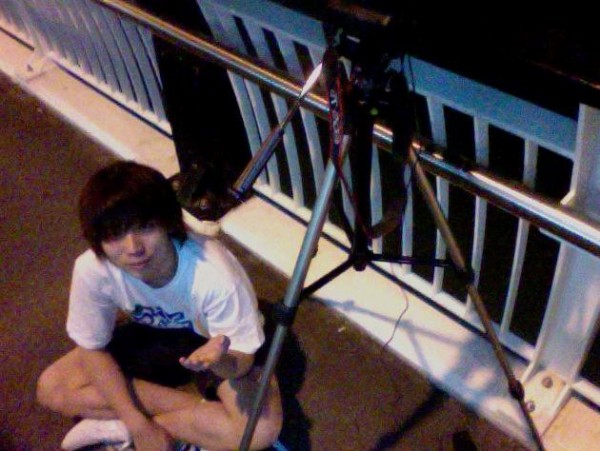
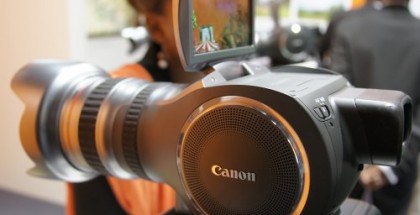
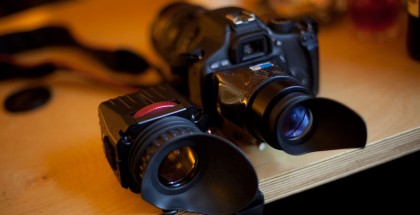
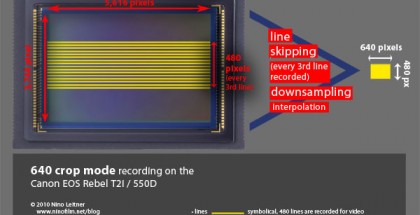
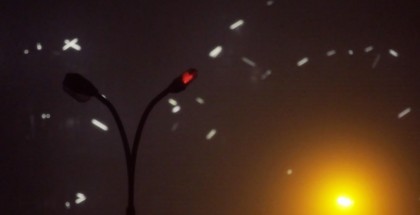
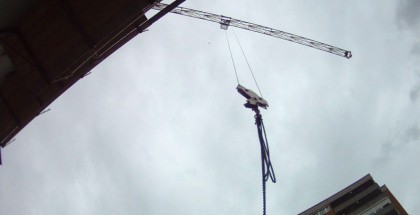

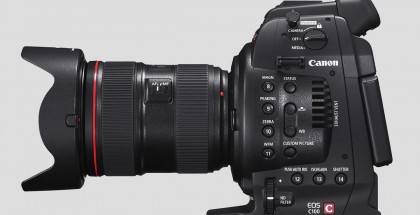













Comments